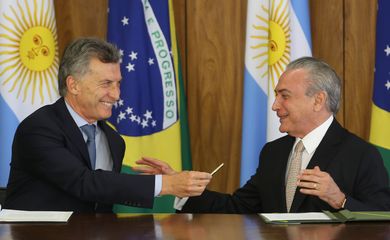Mercosur–Pacific Alliance negotiations make further strides
Regarded as strategic by the Brazilian government, the negotiations for a free-trade deal between Mercosur (an economic bloc formed by Brazil, Argentina, Paraguay, and Uruguay) and the Pacific Alliance (Chile, Colombia, Mexico, and Peru) are still advancing, with a number of initiatives being conducted in this direction.

Among the actions is the seminar “Mercosur–Pacific Alliance: strengthening integration values,” held last week in Brasília to discuss convergence perspectives between the two blocs. The event, promoted by Brazil’s Foreign Ministry, was attended by executives, journalists, Congress members, scholars, representatives from the government, and specialists like Alejandro Navarrete, of the Latin-American Integration Association (Aladi), and Alicia Bárcena, executive secretary at the Economic Commission for Latin America (Cepal).
Initiated in 2014, the cooperation between Mercosur and the Pacific Alliance was intensified last year, after the creation of a concrete agenda with the guidelines for joint activities, in an effort to promote more further eocnomic integration in Latin America.
According to Brazil’s Foreign Minister Aloysio Nunes, “Today, Mercosur and the Pacific Alliance are clearly complementary projects, and the closer ties between the two herald the advent of a new dynamic pole in global economy. Together, the two groupings account for over 90% of the GDP and the flow of foreign direct investment in the region, and total 470 million people—80% of the population in Latin America.
“We’re greatly interested in promoting more and more integration between these two regional blocs. Bolstering closer relations serves the Brazilian government in its plan to more and more strongly introduce Brazil and Mercosur into the global market and economy,” the Brazilian chancellor noted.
Mercosur
Created over two decades ago, Mercosur is the most comprehensive initiative for the regional integration of Latin America, and came about during the process of restoring democracy and bringing the countries closer together in the late 80s. The bloc was founded by Brazil, Argentina, Paraguay, and Uruguay, which signed the Treaty of Asunción, in 1991.
Venezuela joined the bloc in 2012, but has been suspended since December, 2016, for failing to comply with the membership protocol, and, since August, 2017, for violating the bloc’s democratic clause.
All other South American countries are linked to Mercosur as associated states, except for Bolivia, which holds pending membership status.
Paraguayan Chancellor Eladio Loizaga announced that the Mercosur summit meeting, in which his country is to hand over the bloc’s pro tempore chair to Uruguay, will be held this year in Asunción next Monday, June 18.
Pacific Alliance
The Pacific Alliance, formed by Chile, Colombia, Mexico, and Peru, is aimed at commercial and economic integration, chiefly focusing on advancing the free circulation of goods, services, capital, and people. It is the second largest economic bloc in Latin America in exports, second only to Mercosur. Of the country members of the Pacific Alliance, Mexico still does not have a free-trade deal with Mercosur.



